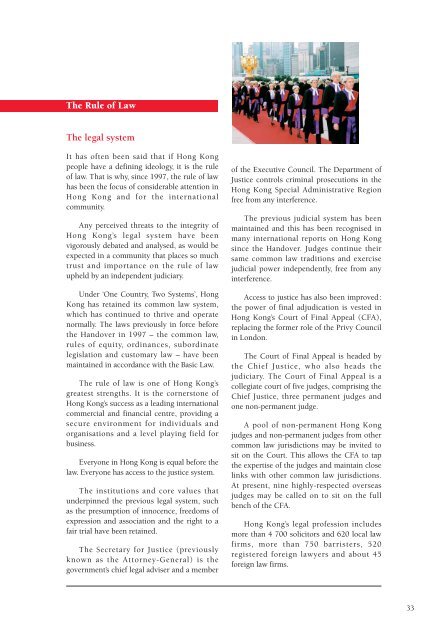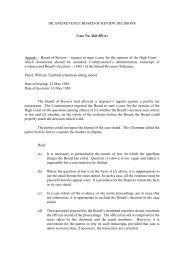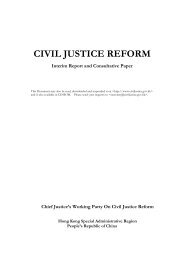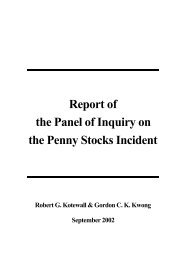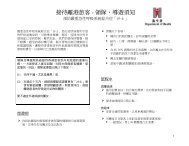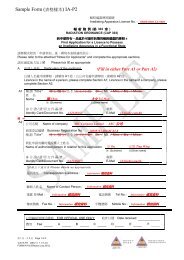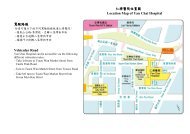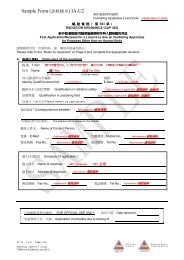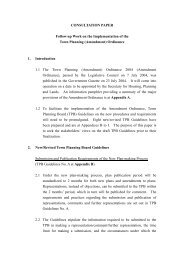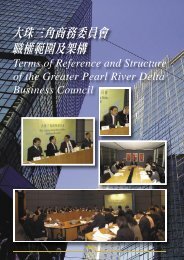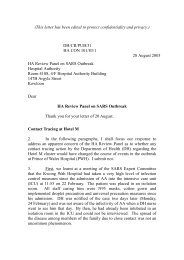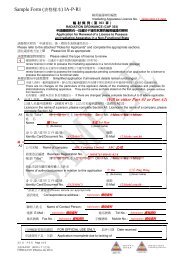The legal system The Rule of Law
The legal system The Rule of Law
The legal system The Rule of Law
You also want an ePaper? Increase the reach of your titles
YUMPU automatically turns print PDFs into web optimized ePapers that Google loves.
<strong>The</strong> <strong>Rule</strong> <strong>of</strong> <strong>Law</strong><br />
<strong>The</strong> <strong>legal</strong> <strong>system</strong><br />
It has <strong>of</strong>ten been said that if Hong Kong<br />
people have a defining ideology, it is the rule<br />
<strong>of</strong> law. That is why, since 1997, the rule <strong>of</strong> law<br />
has been the focus <strong>of</strong> considerable attention in<br />
Hong Kong and for the international<br />
community.<br />
Any perceived threats to the integrity <strong>of</strong><br />
Hong Kong’s <strong>legal</strong> <strong>system</strong> have been<br />
vigorously debated and analysed, as would be<br />
expected in a community that places so much<br />
trust and importance on the rule <strong>of</strong> law<br />
upheld by an independent judiciary.<br />
Under ‘One Country, Two Systems’, Hong<br />
Kong has retained its common law <strong>system</strong>,<br />
which has continued to thrive and operate<br />
normally. <strong>The</strong> laws previously in force before<br />
the Handover in 1997 – the common law,<br />
rules <strong>of</strong> equity, ordinances, subordinate<br />
legislation and customary law – have been<br />
maintained in accordance with the Basic <strong>Law</strong>.<br />
<strong>The</strong> rule <strong>of</strong> law is one <strong>of</strong> Hong Kong’s<br />
greatest strengths. It is the cornerstone <strong>of</strong><br />
Hong Kong’s success as a leading international<br />
commercial and financial centre, providing a<br />
secure environment for individuals and<br />
organisations and a level playing field for<br />
business.<br />
Everyone in Hong Kong is equal before the<br />
law. Everyone has access to the justice <strong>system</strong>.<br />
<strong>The</strong> institutions and core values that<br />
underpinned the previous <strong>legal</strong> <strong>system</strong>, such<br />
as the presumption <strong>of</strong> innocence, freedoms <strong>of</strong><br />
expression and association and the right to a<br />
fair trial have been retained.<br />
<strong>The</strong> Secretary for Justice (previously<br />
known as the Attorney-General) is the<br />
government’s chief <strong>legal</strong> adviser and a member<br />
<strong>of</strong> the Executive Council. <strong>The</strong> Department <strong>of</strong><br />
Justice controls criminal prosecutions in the<br />
Hong Kong Special Administrative Region<br />
free from any interference.<br />
<strong>The</strong> previous judicial <strong>system</strong> has been<br />
maintained and this has been recognised in<br />
many international reports on Hong Kong<br />
since the Handover. Judges continue their<br />
same common law traditions and exercise<br />
judicial power independently, free from any<br />
interference.<br />
Access to justice has also been improved:<br />
the power <strong>of</strong> final adjudication is vested in<br />
Hong Kong’s Court <strong>of</strong> Final Appeal (CFA),<br />
replacing the former role <strong>of</strong> the Privy Council<br />
in London.<br />
<strong>The</strong> Court <strong>of</strong> Final Appeal is headed by<br />
the Chief Justice, who also heads the<br />
judiciary. <strong>The</strong> Court <strong>of</strong> Final Appeal is a<br />
collegiate court <strong>of</strong> five judges, comprising the<br />
Chief Justice, three permanent judges and<br />
one non-permanent judge.<br />
A pool <strong>of</strong> non-permanent Hong Kong<br />
judges and non-permanent judges from other<br />
common law jurisdictions may be invited to<br />
sit on the Court. This allows the CFA to tap<br />
the expertise <strong>of</strong> the judges and maintain close<br />
links with other common law jurisdictions.<br />
At present, nine highly-respected overseas<br />
judges may be called on to sit on the full<br />
bench <strong>of</strong> the CFA.<br />
Hong Kong’s <strong>legal</strong> pr<strong>of</strong>ession includes<br />
more than 4 700 solicitors and 620 local law<br />
firms, more than 750 barristers, 520<br />
registered foreign lawyers and about 45<br />
foreign law firms.<br />
33
<strong>The</strong> <strong>Rule</strong> <strong>of</strong> <strong>Law</strong> (Continued)<br />
Right <strong>of</strong> abode issue<br />
Many <strong>of</strong> Hong Kong’s first constitutional test<br />
cases have revolved around the question as to<br />
who has the right <strong>of</strong> abode (permanent<br />
residency) in Hong Kong under the Basic <strong>Law</strong><br />
after reunification on July 1, 1997.<br />
<strong>The</strong>se cases resulted in two Court <strong>of</strong> Final<br />
Appeal (CFA) decisions delivered on January<br />
29, 1999. <strong>The</strong>se decisions set in motion a<br />
number <strong>of</strong> other <strong>legal</strong> challenges on the issue.<br />
<strong>The</strong> January 1999 decisions gave the right<br />
<strong>of</strong> abode to two categories <strong>of</strong> people whose<br />
right <strong>of</strong> abode claims had not previously been<br />
recognised. Significantly, that CFA judgment<br />
also held that all claimants who arrived in<br />
Hong Kong after July 10, 1997, had to make<br />
their Right <strong>of</strong> Abode applications from the<br />
Mainland and could be removed from Hong<br />
Kong if they entered or remained before their<br />
applications had been processed and their<br />
status confirmed.<br />
<strong>The</strong> government requested the State<br />
Council to seek an interpretation from the<br />
Standing Committee <strong>of</strong> the National People’s<br />
Congress (NPCSC) on the true legislative<br />
intent <strong>of</strong> the Basic <strong>Law</strong> articles in question.<br />
Under the Basic <strong>Law</strong>, the CFA has the<br />
power <strong>of</strong> final adjudication while the NPCSC<br />
has the power <strong>of</strong> final interpretation <strong>of</strong> the<br />
Basic <strong>Law</strong>. In keeping with common law<br />
tradition and Basic <strong>Law</strong> provisions, the<br />
government did not seek to overturn the effect<br />
<strong>of</strong> the January 29 ruling on the parties to that<br />
case.<br />
On June 26, 1999, the NPCSC issued an<br />
interpretation <strong>of</strong> the relevant Basic <strong>Law</strong><br />
provisions. This interpretation has since been<br />
followed by the courts in other cases dealing<br />
with the right <strong>of</strong> abode matter.<br />
<strong>The</strong> NPCSC’s interpretation stated that<br />
only children whose parents were Hong Kong<br />
permanent residents at the time <strong>of</strong> their birth<br />
were entitled to the right <strong>of</strong> abode. This is in<br />
keeping with international practice. Few<br />
countries, if any, allow immigrants to pass on<br />
their right <strong>of</strong> abode to children born<br />
elsewhere before they themselves have<br />
acquired that right.<br />
<strong>The</strong> government’s decision to seek an<br />
interpretation was not without controversy,<br />
prompting some to comment that the CFA’s<br />
authority had been undermined. But in a<br />
subsequent right <strong>of</strong> abode ruling in December<br />
1999, the CFA confirmed that the NPCSC<br />
interpretation was both lawful and<br />
constitutional. <strong>The</strong> rule <strong>of</strong> law and the<br />
independence <strong>of</strong> the judiciary had not been<br />
undermined.<br />
Understandably, the issue has generated<br />
considerable debate – <strong>of</strong>ten emotive – because<br />
most cases involve family reunion.<br />
When asked in a recent newspaper article<br />
(South China Morning Post, June 14, 2002)<br />
whether the referral had humiliated the court<br />
or diminished its authoity, the Chief Justice <strong>of</strong><br />
the Court <strong>of</strong> Final Appeal, Mr Justice Li<br />
replied: “I did not feel any <strong>of</strong> those things.”<br />
Further cases may still be brought to the<br />
courts but these are now likely to focus on<br />
particular facts <strong>of</strong> each case rather than<br />
matters <strong>of</strong> basic principle which have so far<br />
been the focus <strong>of</strong> litigation.<br />
34
Hong Kong Special Administrative Region Government<br />
<strong>The</strong> issue took a tragic turn in August<br />
2000. Two people died – one <strong>of</strong> them a Senior<br />
Immigration Officer – and 48 were injured<br />
when right <strong>of</strong> abode claimants set fire to an<br />
<strong>of</strong>fice in the Immigration Tower. Of those<br />
injured, 25 were Immigration Department<br />
staff.<br />
In the most recent test case in January<br />
2002, involving some 5 000 claimants who<br />
were mostly ruled ineligible to claim the right<br />
<strong>of</strong> abode, the government was criticised in the<br />
media for lacking compassion or being<br />
callous.<br />
However, it should be emphasised that the<br />
majority <strong>of</strong> claimants are not children but<br />
adults, ranging in age from 19 to 70.<br />
According to a sample survey conducted by<br />
the Immigration Department many, if not<br />
most, <strong>of</strong> the claimants themselves have<br />
spouses and children in the Mainland.<br />
Throughout the appeal period the<br />
claimants were treated fairly and<br />
compassionately. All claimants were eligible to<br />
apply for <strong>legal</strong> aid. All were able to seek<br />
redress through the courts. All had access to<br />
heavily subsidised medical care through Hong<br />
Kong’s public hospital <strong>system</strong>.<br />
Of the 3 800 claimants now (mid-June<br />
2002) remaining in Hong Kong after the<br />
January 2002 judgment, only about 300, or<br />
7%, are aged under 18. In January this year,<br />
Mainland authorities announced that children<br />
under 18, with parents living in Hong Kong,<br />
should be able to enter Hong Kong within<br />
a year.<br />
It should also be noted that Hong Kong’s<br />
immigration policy, like that <strong>of</strong> many other<br />
jurisdictions, is based on controlled and<br />
orderly entry.<br />
Every year, 54 000 Mainland migrants<br />
come to settle with their families in Hong<br />
Kong – the equivalent to 0.8% <strong>of</strong> our<br />
population. Few other jurisdictions can claim<br />
such an intake and assimilation rate for<br />
migrants seeking family reunion.<br />
<strong>The</strong> government stated clearly that there<br />
would not be an amnesty for those who lost<br />
the most recent court case and who were<br />
clearly not entitled to settle in Hong Kong<br />
permanently.<br />
It would be unfair to allow claimants to<br />
‘jump the queue’ ahead <strong>of</strong> others who have<br />
been waiting patiently and lawfully in the<br />
Mainland to come to join their families. This<br />
stance was supported by a vast majority <strong>of</strong><br />
Hong Kong people.<br />
In April 2002 the government started to<br />
deport claimants who had not returned<br />
voluntarily to the Mainland. <strong>The</strong> January 10,<br />
2002, CFA ruling provided a firm <strong>legal</strong> basis<br />
for that action.<br />
Regional Arbitration Centre<br />
Hong Kong has established itself as a regional<br />
centre for arbitration.<br />
<strong>The</strong> number <strong>of</strong> cases heard by the Hong<br />
Kong International Arbitration Centre<br />
(HKIAC) has risen substantially over the past<br />
decade because <strong>of</strong> the increased popularity <strong>of</strong><br />
arbitration and mediation to resolve disputes,<br />
and the growth <strong>of</strong> the HKSAR as a regional<br />
dispute resolution centre.<br />
Arbitration awards made in Hong Kong<br />
can be enforced in more than 120<br />
jurisdictions that are signatories to the New<br />
York Convention on the Recognition and<br />
Enforcement <strong>of</strong> Foreign Arbitral Awards.<br />
Disputes referred to the HKIAC rose from<br />
94 in 1991, to 218 in 1997 and 307 in 2001.<br />
<strong>The</strong> HKIAC handles significantly more cases<br />
than similar arbitration centres in Japan,<br />
Singapore, Malaysia and Korea combined.<br />
35
<strong>The</strong> <strong>Rule</strong> <strong>of</strong> <strong>Law</strong> (Continued)<br />
<strong>Law</strong> and order<br />
Hong Kong remains one <strong>of</strong> the world’s safest<br />
large cities. This is mainly due to a high<br />
visible police presence on around-the-clock<br />
foot patrols; strictly-enforced laws on the<br />
possession <strong>of</strong> guns and other lethal weapons;<br />
and, a law abiding community that respects<br />
the rule <strong>of</strong> law and the work <strong>of</strong> law<br />
enforcement <strong>of</strong>ficers.<br />
1 200<br />
1 150<br />
1 100<br />
1 050<br />
Crime rate 1997 - 2001*<br />
1 000<br />
1997 1998 1999<br />
*Crimes per 100 000 population<br />
2000<br />
2001<br />
Such close relationships with Mainland<br />
and law enforcement authorities abroad have<br />
helped Hong Kong in the ongoing fight<br />
against organised crime, il<strong>legal</strong> narcotics,<br />
currency and credit card fraud and money<br />
laundering.<br />
Boundary integrity<br />
Hong Kong’s Police Force – <strong>of</strong>ten referred<br />
to as ‘Asia’s Finest’ – is well trained and<br />
equipped. <strong>The</strong> Police-to-population ratio <strong>of</strong><br />
417 <strong>of</strong>ficers for every 100 000 people is one <strong>of</strong><br />
the highest in the world. It compares to about<br />
339 in Tokyo and 205 in Singapore.<br />
Hong Kong has one <strong>of</strong> the world’s busiest<br />
boundary crossings. In 2001, about 106<br />
million people and 11.3 million vehicles<br />
crossed back and forth between Hong Kong<br />
and the Mainland.<br />
<strong>The</strong> Hong Kong Police Force has about<br />
38 500 members, including 27 930 regular<br />
<strong>of</strong>ficers, 4 620 Auxiliary Police and 5 860<br />
civilian support staff. Amongst others, it has<br />
specialised units to deal with organised crime,<br />
airport security, crowd management,<br />
vulnerable witnesses and VIP protection.<br />
<strong>The</strong> Police Force has continued to<br />
maintain close liaison with international law<br />
enforcement agencies such as the FBI and the<br />
CIA, the Australian Federal Police, the Royal<br />
Canadian Mounted Police, Scotland Yard and<br />
Interpol. It has also developed close cooperation<br />
with law enforcement counterparts<br />
on the Mainland at policy and working levels.<br />
Every day, an average <strong>of</strong> about 313 000<br />
people and more than 31 300 vehicles cross<br />
back and forth between the Hong Kong SAR<br />
and the Mainland, with most people heading<br />
into neighbouring Guangdong Province.<br />
36
Hong Kong Special Administrative Region Government<br />
<strong>The</strong> Hong Kong SAR Government has<br />
remained responsible for law and order within<br />
Hong Kong, which includes maintaining the<br />
integrity <strong>of</strong> the sea and land boundaries with<br />
the Mainland as a separate customs and<br />
immigration territory.<br />
Customs and Excise <strong>of</strong>ficers work closely<br />
with the Police and other international law<br />
enforcement agencies to combat the<br />
trafficking <strong>of</strong> il<strong>legal</strong> drugs. <strong>The</strong>y are also<br />
responsible for preventing and detecting<br />
smuggling between Hong Kong and the<br />
Mainland and for protecting and enforcing<br />
intellectual property rights in Hong Kong.<br />
Immigration <strong>of</strong>ficers are responsible for<br />
preventing, detecting and removing il<strong>legal</strong><br />
workers. <strong>The</strong>y also work with Police against<br />
il<strong>legal</strong> immigration, forged travel documents<br />
and foreign prostitutes.<br />
<strong>The</strong> Immigration Department has regular<br />
dealings with locally-based foreign consulates<br />
to share intelligence and foster goodwill and<br />
co-operation on immigration control,<br />
facilitation <strong>of</strong> Hong Kong residents travelling<br />
overseas and the control <strong>of</strong> foreign nationals<br />
in Hong Kong.<br />
Immigration<br />
35 000<br />
30 000<br />
25 000<br />
20 000<br />
15 000<br />
10 000<br />
5 000<br />
1997<br />
Emigration 1997 - 2001<br />
1998<br />
1999<br />
2000<br />
2001<br />
Emigration from Hong Kong has declined for<br />
seven consecutive years and is its lowest level<br />
in more than 20 years. This is an indication <strong>of</strong><br />
long-term confidence in the Hong Kong SAR.<br />
In 2001, about 10 600 people emigrated –<br />
an 11% decrease over the 11 900 in 2000 and<br />
a 66% decrease since 1997.<br />
In recent years, about 80-90% <strong>of</strong> all<br />
emigrants have gone to Canada, the United<br />
States or Australia.<br />
600 000<br />
550 000<br />
500 000<br />
450 000<br />
400 000<br />
1997<br />
Foreign residents*<br />
1998<br />
*At 31 December each year<br />
1999<br />
2000<br />
2001<br />
At the same time, there has been a steady<br />
increase in the number <strong>of</strong> expatriates calling<br />
Hong Kong home.<br />
At the end <strong>of</strong> 2001, there were more than<br />
525 000 expatriates living in Hong Kong,<br />
with sizeable groups from the USA, Canada,<br />
Australia, the United Kingdom and Japan.<br />
<strong>The</strong>re were more than 235 000 expatriates<br />
from <strong>The</strong> Philippines, Indonesia, Thailand,<br />
India, Sri Lanka and Nepal who mainly work<br />
as domestic helpers.<br />
Since July 1, 1997, more than 1.9 million<br />
HKSAR Passports had been issued by the<br />
Immigration Department. HKSAR Passport<br />
holders now enjoy visa-free access to 113<br />
countries or territories, including the EU,<br />
compared to 47 countries in June 1998.<br />
<strong>The</strong> greater acceptance <strong>of</strong> the HKSAR<br />
Passport as a travel document is evidence <strong>of</strong><br />
international confidence in Hong Kong’s<br />
immigration regime and the state-<strong>of</strong>-the-art<br />
37
<strong>The</strong> <strong>Rule</strong> <strong>of</strong> <strong>Law</strong> (Continued)<br />
security features embedded into the passport<br />
to prevent forgery or tampering.<br />
At present, Hong Kong <strong>of</strong>fers visa-free<br />
access for periods ranging from one week to<br />
six months to more than 170 countries and<br />
territories.<br />
Combating corruption<br />
Corruption is not an accepted feature <strong>of</strong> Hong<br />
Kong. People do not like it and they have little<br />
tolerance for it. – ‘Corruption in Asia’, Political<br />
and Economic Risk Consultancy, March 6,<br />
2002.<br />
Pro-active and resolute action by the<br />
Independent Commission Against Corruption<br />
(ICAC) has continued to be a major force in<br />
providing a cherished level playing field for<br />
business in Hong Kong.<br />
Concerns over the effectiveness <strong>of</strong> the<br />
ICAC after 1997 have long dissipated through<br />
continued and vigorous enforcement action.<br />
<strong>The</strong> public support rate hovers at 99%. <strong>The</strong>re<br />
is no doubt that a culture <strong>of</strong> intolerance <strong>of</strong><br />
corruption has firmly taken root in Hong<br />
Kong.<br />
Established in 1974, the ICAC has<br />
evolved into one <strong>of</strong> the world’s most effective<br />
anti-corruption agencies. It has been<br />
described as a ‘model anti-corruption agency’<br />
in the Transparency International Global<br />
Corruption Report (October 2001).<br />
<strong>The</strong> ICAC investigates corruption cases in<br />
both the public and private sectors. A ‘zero<br />
tolerance’ stance against corruption has<br />
rendered Hong Kong one <strong>of</strong> the world’s<br />
cleanest administrations. Systemic corruption<br />
does not exist in the civil service.<br />
<strong>The</strong> ICAC helps government departments<br />
and public bodies to rid their <strong>system</strong>s <strong>of</strong><br />
corruption opportunities while assisting<br />
private companies to strengthen internal<br />
controls.<br />
To maintain and enhance public support<br />
and vigilance against corruption, the ICAC<br />
produces educational and media programmes<br />
for all strata <strong>of</strong> the community. In addition,<br />
the Internet is also becoming a medium <strong>of</strong><br />
choice for reaching the mass market.<br />
38


